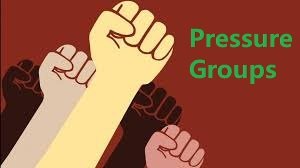AWIP, GS P5 (History, Polity, Governance...), Indian Polity & The Constitution of India
Q. Critically analyze the role of pressure groups in Indian political process? Do you think that in recent years, they have emerged as an important actor on Indian political landscape?
Role of Pressure Groups in the Indian Political Process
Pressure groups, also known as interest groups or advocacy groups, play a significant role in the Indian political landscape. Their primary objective is to influence public policy and decision-making processes to favor their specific interests without seeking direct political power.
Functions and Influence
- Policy Advocacy: Pressure groups lobby for policy changes that benefit their members. For example, the Federation of Indian Chambers of Commerce and Industry (FICCI) advocates for business-friendly policies.
- Representation: They represent the interests of various segments of society, such as farmers, workers, and businesses. The All India Kisan Sabha represents farmers’ interests, while the Indian National Trade Union Congress (INTUC) represents workers.
- Public Opinion: Pressure groups mobilize public opinion through campaigns, demonstrations, and media engagement. For example, environmental groups like the Centre for Science and Environment (CSE) raise awareness about environmental issues.
- Research and Expertise: They provide valuable research, data, and expertise to policymakers. Think tanks like the Observer Research Foundation (ORF) contribute to informed policy-making.
- Checks and Balances: Pressure groups act as a check on government power, ensuring accountability and transparency. Civil society organizations often play this role in fighting corruption and human rights abuses.
- Channeling Grievances: They provide a platform for marginalized or disadvantaged groups to voice their concerns. For instance, Dalit organizations advocate for the rights of Scheduled Castes and Tribes.
Critical Analysis
Positive Aspects
- Democratic Participation: Pressure groups enhance democratic participation by involving citizens in the political process beyond just voting.
- Specialization and Expertise: They bring specialized knowledge and expertise to complex policy issues, aiding informed decision-making.
- Pluralism: The existence of multiple pressure groups promotes pluralism and ensures that diverse interests are represented in the political arena.
- Policy Innovation: They often introduce innovative ideas and solutions to public policy challenges.
Negative Aspects
- Unequal Influence: Wealthier and more organized pressure groups may have disproportionate influence, leading to policies that favor specific interests over the public good.
- Lack of Accountability: Unlike elected representatives, pressure groups are not accountable to the public, raising concerns about their legitimacy and transparency.
- Policy Fragmentation: The influence of numerous pressure groups can lead to policy fragmentation and inconsistency.
- Rent-Seeking: Some pressure groups engage in rent-seeking behavior, seeking benefits from the government without contributing to societal welfare.
Emergence as an Important Actor
In recent years, pressure groups have indeed emerged as crucial actors in the Indian political landscape. Several factors contribute to this trend:
- Economic Liberalization: Since the 1990s, economic liberalization has led to the growth of business and industry pressure groups seeking to influence economic policies.
- Civil Society Activism: Increased civil society activism has given rise to numerous non-governmental organizations (NGOs) and advocacy groups focusing on issues like human rights, environmental protection, and social justice.
- Media and Communication: The proliferation of media and communication technologies has amplified the voice of pressure groups, enabling them to mobilize support and influence public opinion more effectively.
- Judicial Activism: The judiciary’s increasing willingness to entertain public interest litigations (PILs) filed by pressure groups has enhanced their role in shaping public policy.
- Social Movements: Social movements, such as the anti-corruption movement led by Anna Hazare and the recent farmers’ protests, demonstrate the significant impact pressure groups can have on the political process.
Conclusion
Pressure groups play a multifaceted role in the Indian political process, contributing to policy advocacy, representation, and democratic participation. While they have positive impacts by bringing expertise and promoting pluralism, concerns about unequal influence and lack of accountability remain. In recent years, their importance has grown, driven by economic liberalization, civil society activism, media proliferation, judicial activism, and social movements. Balancing their influence with the need for equitable and transparent policy-making is crucial for the healthy functioning of democracy in India.


